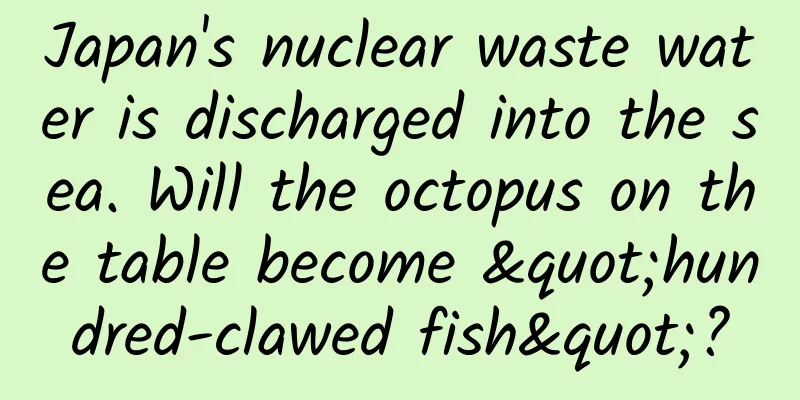Japan's nuclear waste water is discharged into the sea. Will the octopus on the table become "hundred-clawed fish"?

|
On August 4, 2022, CCTV News reported that the plan to discharge contaminated water from Fukushima nuclear power plant in Japan has started. According to overseas news, Tokyo Electric Power Company said on August 3 that it may officially discharge contaminated water in the summer of 2023. It has been more than ten years since the March 2011 earthquake in Japan caused a large amount of radioactive material to leak from the Fukushima nuclear power plant. After more than a decade of planning, the Japanese government finally decided to discharge nuclear contaminated water into the sea. What impact will this decision have on global seafood and the environment? Can we still happily eat seafood sashimi in the future? Will the octopus on the table turn into a "hundred-clawed fish"? NetEase Health specially consulted Shang Qi, a researcher at the Institute of Environment, Chinese Center for Disease Control and Prevention, to find out. Danger! With the Minamata disease as a lesson, Japan's nuclear wastewater discharge into the sea will cause lasting harm to humans Shang Qi: First of all, there are similar painful lessons in history. In 1956, the Minamata disease that shocked the world by causing cats to go crazy and people to become insane appeared in Minamata Bay, Japan. It was the earliest public health disease caused by industrial wastewater pollution. We know that the ocean is a large ecosystem with many levels of food chains. After enrichment in the food chain, the weak concentration of harmful substances in the ocean will be accumulated to a very high concentration. Minamata disease is a typical example. At that time, the concentration of mercury discharged by the factory was very low, but after enrichment in the food chain, according to literature reports, the concentration of harmful substances exceeded 300,000 times. So the local fishermen ate contaminated seafood, which led to the occurrence of Minamata disease. Minamata disease is a disease in which the central nervous system and peripheral nerves of the patient's brain are invaded. In mild cases, the patient has slurred speech, facial dementia, paralysis of the hands and feet, and loss of vision. In severe cases, the patient has neurological disorders, body bending and screaming, and even death. In addition, the descendants of Minamata disease patients cannot escape the bad luck. This disease is highly hereditary and may cause congenital Minamata disease in infants, and the symptoms are similar to polio. Therefore, it will not be a day or a night to eliminate the impact of Minamata disease. The Japanese government is going to discharge the Fukushima nuclear waste water into the ocean. This is a very dangerous move that will cause two major problems. First, it will cause trouble to society. Because radioactive nuclides are discharged into the ocean with the nuclear waste water, regulatory authorities need to conduct targeted supervision and monitoring of the marine environment and seafood, which will increase social management costs. Second, it causes health problems. According to a report by the Japan Broadcasting Association TV station, in February 2021, the content of radioactive cesium detected in black fish caught from the coast of Fukushima Prefecture, Japan reached 500 becquerels per kilogram, which is five times higher than Japan's standard for the content of radioactive substances in food. Radioactive nuclides can cause changes and damage to the genes of marine organisms, causing devastating pollution. At the same time, it also increases the potential food safety risks in the human food chain system, which in turn leads to increased risks to human health. The harm caused is persistent and difficult to disappear in the short term. Danger! The concentration of radionuclides in diluted nuclear wastewater does not mean a reduction in total emissions. The danger still exists. Shang Qi: Some experts believe that Japan's nuclear wastewater has reached a relatively safe dilution standard and the risk of discharge is very low. In fact, this is not the case. Although the concentration of radionuclides in the planned nuclear wastewater has been diluted, the total amount of these substances discharged into the sea will not decrease. Although the initial concentration of the discharge is very low, the discharged substances are long-lasting and harmful. Over time, they will be enriched to a very high concentration through the marine food chain system, which may reach tens of thousands or even hundreds of thousands of times the initial concentration. In the end, eating these seafood will still cause high health risks. For example, tuna, which is often eaten by everyone, is at a high level in the food chain system. If its living environment is contaminated by nuclear waste water, it is likely that its radioactive nuclide content will be very high, causing a greater food safety risk. Crisis! Nuclear wastewater has the greatest impact on Japanese waters? Too naive! The living environment of all mankind will face a huge crisis Shang Qi: It cannot be simply understood. The closer the sea is to Japan, the greater the risk of seafood being contaminated. We understand that the nuclear wastewater to be discharged contains many long-term radioactive nuclides such as radioactive carbon-14 and tritium, which will exist in marine life for a long time and gradually spread to the world's oceans with the movement of ocean currents and the movement of marine life such as fish. Therefore, after a certain period of time, the content of pollutants will reach the global average, and humans cannot control this process. Therefore, not only the seafood in Japanese waters will be affected, but the world's oceans will gradually be polluted, and the human living environment will face a huge crisis. We all live in the same global village. In the case of Japan's nuclear wastewater discharge into the sea, no one is a bystander or an outsider. Wastewater containing radioactive nuclides from Fukushima, Japan is still being produced continuously. If it is allowed to be discharged into the sea at will, when will it end? The Japanese government should fundamentally solve the problem of nuclear wastewater from the Fukushima nuclear power plant as soon as possible, instead of just discharging it into the sea. Japan should be responsible to all mankind and future generations, attach importance to and re-examine this decision, and stop the irresponsible and wrong behavior of discharging nuclear wastewater into the sea that harms the marine ecological environment. |
>>: This bedtime habit may keep you awake!
Recommend
Create a father for yourself: How Google changed the world again
The giant Google is going to reorganize. On Augus...
Weibo released a mobile phone report, and fewer and fewer people use iPhones
There is another new smartphone report, and this ...
The principle and solution of foam formation
Foam is a common phenomenon. Generally speaking, ...
User Operations: 3 Secrets of Super User Thinking!
The story of the internet celebrity boss lady: As...
6 major trends in the development of Chinese advertising media in 2021
In 2021, the global economy is recovering and gro...
Re-understanding the R8 compiler from an online question
background In the past period of time, JD Android...
Which minefields are most likely to occur when traditional enterprises conduct bidding promotion?
When a company first starts bidding, if it choose...
Lollipops are slowing down, KitKat is still going strong, and Gingerbread is not going away
[[128565]] Google releases Android system version...
How to make Baidu snapshot and how much does it cost to promote Baidu snapshot?
Some customers will ask, "How much does Baid...
Understand brand communication in 3 sentences!
This article starts with the topic of communicati...
Get a full refund from VATTI World Cup, and talk about the 5 correct approaches to new media marketing
The World Cup is over, France won the championshi...
Nezha Conquers the Dragon King teaches you how to prevent cancer: fighting the cancer demon with three heads and six arms, you must prepare these "magic weapons"!
When the Dragon King stirred up the storm, Nezha ...
“How Much Do You Know About Nutrition” Series | Do you consume the seven major nutrients that maintain the body’s survival every day?
As we all know, the human body structure is compo...
Forced to choose between two options? Pinduoduo’s road to brand upgrade!
If it weren’t for the limited-time promotion of W...
Analysis of JD Finance’s private domain operations!
Regarding the financial industry's approach t...









